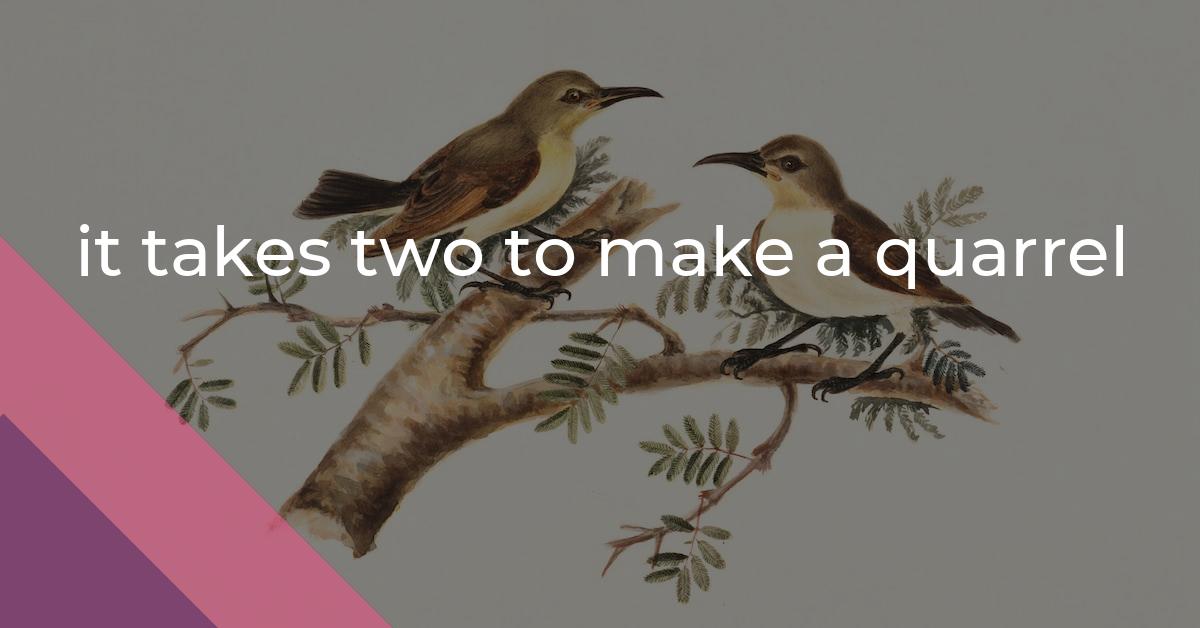it takes two to make a quarrel: Idiom Meaning and Origin
What does ‘it takes two to make a quarrel’ mean?
The idiom "it takes two to make a quarrel" means that both parties involved are equally responsible for a dispute or argument.

Idiom Explorer
The idiom "it takes all kinds to make a world" means that the world is diverse and made up of people with different characteristics, opinions, and behaviors.
The idiom "hit two targets with one arrow" means to achieve two goals or objectives with a single action or effort.
The idiom "have words" means to argue or have a heated discussion with someone.
The idiom "go together" means that two or more things are harmoniously compatible or commonly associated with each other.
The idiom "go halves" means to share the cost or responsibility of something equally with someone else.
The idiom "go halfsies" means to split the cost or share something equally between two people.
The idiom "give and take" means to compromise or negotiate with others, by both parties making concessions and understanding each other's needs.
The idiom "fight fire with fire" means to combat a problem or attack by using similar methods or tactics as the opposite party. It suggests using their own aggressive actions against them.
The idiom "fall out" means to have a quarrel or disagreement with someone. It refers to a situation where two individuals no longer get along or have a conflict that causes distance or hostility between them.
The idiom "fall foul" means to come into conflict or disagreement with someone or something, often resulting in negative consequences.
Decoding the Quarrel Dynamics
The idiom "it takes two to make a quarrel" is a common English expression that conveys the idea that a dispute or argument requires the active participation of both parties involved. This phrase emphasizes the mutual responsibility for conflicts, suggesting that the actions or attitudes of multiple individuals are necessary for the quarrel to occur.
Although the exact origin of this idiom is unclear, it can be traced back to the concept of interpersonal dynamics and the recognition that conflicts typically require the involvement of more than one person. The concept of shared responsibility in arguments is a recurring theme across cultures and languages, making it challenging to pinpoint a definitive source.
It is important to note that the idiom "it takes two to make a quarrel" is not intended to downplay or dismiss the impact of one party's actions in a dispute. Rather, it serves as a reminder that conflicts often arise from the interactions and reactions between multiple individuals. By emphasizing the mutual contribution to a quarrel, this idiom highlights the need for both parties to actively participate and take responsibility for resolving the conflict.
The idiom "it takes two to make a quarrel" can be applicable to various situations and relationships, ranging from personal disputes to international conflicts. Its universal relevance stems from the acknowledgment that resolving disagreements involves the efforts and cooperation of all parties involved.
One related idiom that reinforces this idea is "go halves." This phrase is used to describe a situation where two parties come together to share the responsibility or cost of something. In the context of a quarrel, "go halves" suggests that both parties must be willing to share the burden of resolving the conflict and finding a mutually beneficial solution.
Another related idiom is "it takes all kinds to make a world." This expression emphasizes the diversity of people and ideas that make up our world. In the context of a quarrel, it highlights the fact that conflicts often arise from differing perspectives and opinions. Understanding and appreciating these differences can help foster empathy and promote a more collaborative approach to resolving disputes.
The idiom "give and take" is also relevant to the concept of "it takes two to make a quarrel." "Give and take" refers to the process of compromising and finding a middle ground in order to maintain a healthy relationship or resolve a conflict. In a quarrel, both parties must be willing to give and take, to understand and consider each other's perspective, and to find a common ground upon which to resolve their differences.
By exploring idiomatic expressions such as "go halves," "it takes all kinds to make a world," and "give and take," we gain a deeper understanding of the intricacies of language and the cultural nuances embedded within idioms. These phrases reflect our understanding of interpersonal dynamics and the importance of active participation, empathy, and compromise in resolving conflicts.
The idiom "it takes two to make a quarrel" carries a sense of both finality and endless possibility. It reminds us that conflicts require the active participation of all involved parties, while also leaving room for introspection and self-reflection. Through a deeper understanding of idiomatic expressions, we can continue to decipher the rich tapestry of language and the wisdom it encapsulates.
Example usage
Examples:
1. Jenny and Kevin were constantly arguing, but they finally realized that it takes two to make a quarrel.
2. Sarah blamed her friend for their fight, but her friend reminded her that it takes two to make a quarrel.
3. The siblings always seemed to fight over something, until their parents advised them that it takes two to make a quarrel.
More "Relationships" idioms



